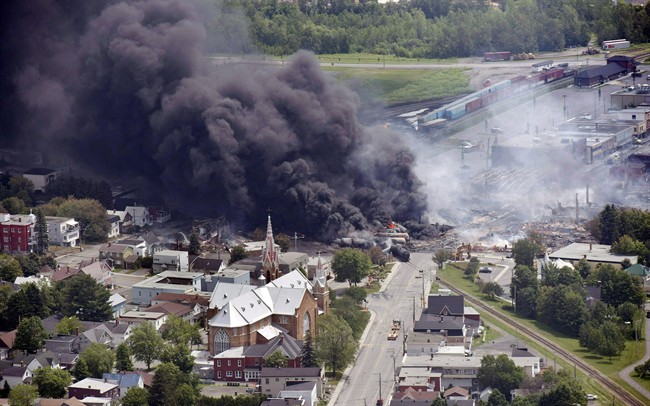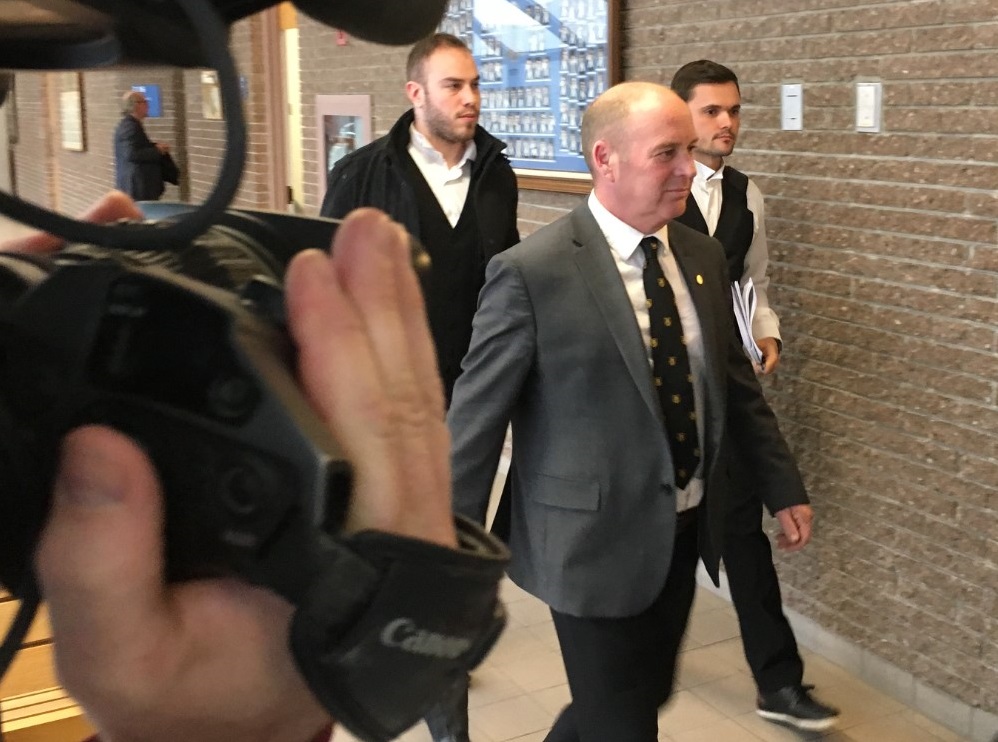The engineer of the train that derailed, exploded and killed 47 people in Lac-Mégantic didn’t act perfectly the night of the tragedy, but he acted reasonably, his lawyer said in his closing arguments Monday.

Lawyer Charles Shearson told the 14 jurors he admits Tom Harding didn’t conduct a proper brake test on the train after he parked the oil-laden convoy outside the small town the night of July 5, 2013.
READ MORE: Are the right people on trial for Lac-Mégantic train disaster?
But Harding wasn’t acting outside normal company procedures, Shearson suggested.
He added that Montreal, Maine and Atlantic Railway, which owned the train and the tracks, didn’t inform Harding of the latent risks of parking a train in such a location and that his deviation from the rules that night was not a criminal act.
“We can’t criminalize every departure from a rule,” Shearson said.
“Although Harding’s conduct was not perfect, it was reasonable. When you look at the entirety of the evidence you have the image of a very reliable man.”
The Crown has argued Harding neither applied the required number of brakes on the train nor tested the system properly to ensure the brakes were working before he left for the night.
READ MORE: Closing arguments continue in Lac-Mégantic train disaster trial
Early the following morning, the train carrying crude oil began moving on its own, headed down to Lac-Mégantic, derailed and exploded, killing the 47 and destroying part of the downtown core.

Get daily National news
Harding and his two former colleagues, Richard Labrie and Jean Demaitre, have all pleaded not guilty to one count of criminal negligence causing the death of 47 people.
Labrie was the traffic controller and Demaitre the manager of train operations.
WATCH BELOW: Trial underway
Shearson told jurors the evidence presented during the trial showed the proper number of brakes that needed to be applied to the train was discovered only after the tragedy.
He added Harding left the locomotive running, applied air brakes and a certain number of handbrakes.
“The train wasn’t going anywhere,” Shearson said.
Evidence at the trial showed the train began moving only after a fire broke out on the locomotive and after the firefighters called to the blaze shut the engine off.
The shutdown of the engine caused a loss of air, compromising the brake system, Shearson said.
Moreover, he said in order to find Harding guilty, jurors need to believe he showed a “marked and substantial departure from the norm (the accused’s) mindset has to be so careless it shows a wanton disregard for the lives and safety of others.”
Shearson replayed a recording heard earlier during the trial of a conversation between Harding and another railway employee the night of the derailment, during which the accused is told the locomotive caught fire after he had left for the night.
Harding is heard asking whether someone was heading to the fire site and if he needed to return to help out.
READ MORE: Train conductor played significant role in Lac-Mégantic tragedy: Crown
He is told the situation was under control and to go back to bed.
“The evidence of (Harding’s) state of mind that night shows he was conscientious and not reckless,” Shearson said.
Shearson is to finish his arguments Tuesday and Quebec Superior Court Justice Gaetan Dumas is expected to give his instructions to the jury Wednesday.
READ MORE: 1st witnesses testify in trial of 3 men in Lac-Mégantic train disaster
The Crown delivered its closing arguments last week, as did lawyers representing Labrie and Demaitre.











Comments